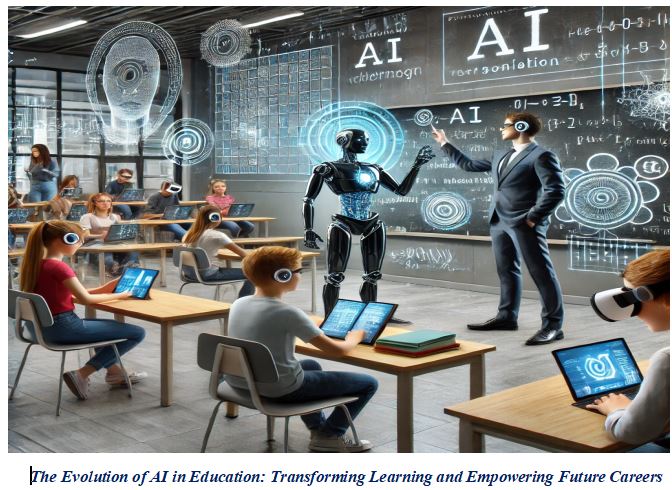Author: Dr. S Murali; Associate Professor; RIMS, Gokula
Introduction
Artificial Intelligence (AI) is reshaping nearly every industry, and education is no exception. As AI continues to evolve, its influence in the educational sector is becoming more profound, bringing revolutionary changes in the way students learn and how teachers teach. The integration of AI into education is creating personalized learning paths, improving access to resources, and equipping students with the skills required for the jobs of tomorrow. This article explores how AI is transforming education, the new learning landscapes it’s creating, and how students can leverage these opportunities to build successful careers.

The Role of AI in Personalized Learning
AI-driven tools are helping educators move away from traditional one-size-fits-all approaches toward personalized learning experiences. With machine learning algorithms analyzing data on student performance, AI can suggest custom learning paths that cater to each individual’s strengths and weaknesses. Adaptive learning platforms allow students to progress at their own pace, which improves both comprehension and retention of information.
Virtual tutors, for example, can provide students with real-time feedback and additional resources to help them overcome challenges in specific subject areas. Intelligent tutoring systems are available 24/7, allowing students to study at their convenience, breaking geographical and time limitations that used to hamper traditional education methods.
AI-Enhanced Teaching Methods
For educators, AI is a powerful assistant. Administrative tasks, such as grading and student assessment, are often time-consuming and tedious. AI tools can now automate these processes, freeing up teachers to focus on more meaningful interactions with students. Moreover, AI-powered tools can analyze a class’s overall performance and suggest improvements in teaching methods, allowing for a more efficient learning environment.
Additionally, AI can help identify students who might be struggling or are at risk of falling behind. Early intervention can prevent such students from dropping out or under-performing. Teachers can then provide more tailored support to students who need it most, creating a more inclusive educational experience.
Breaking Barriers with AI
In many parts of the world, access to quality education is limited due to various factors, including geography, sociolect-economic status, or physical disabilities. AI-driven platforms, however, are breaking down these barriers by offering virtual classrooms and personalized learning experiences accessible from anywhere.
AI tools like speech recognition software and real-time language translation services have made learning more inclusive for students with disabilities or those who speak different languages. These innovations ensure that everyone, regardless of background, can benefit from quality education.
In underdeveloped regions, where there may be a shortage of teachers, AI tools and intelligent systems can fill the gap, providing standardized teaching content and personalized tutoring to under-served students.
AI and Career Preparation
The job market is rapidly evolving, and the skills required today might not be relevant tomorrow. AI is playing a crucial role in career preparation by helping students stay ahead of industry trends. AI can analyze current job market data, predict which skills will be in demand, and recommend the right courses for students to take to stay competitive.
Moreover, AI-driven career counselling tools are providing personalized career advice based on a student’s interests, strengths, and market trends. This makes it easier for students to make informed decisions about their future, aligning their educational paths with real-world opportunities.
AI also promotes skill development in areas critical for the future workforce, such as data analysis, coding, and digital literacy. By integrating these skills into the curriculum, AI-powered learning platforms ensure that students are ready to enter industries such as technology, finance, healthcare, and more.
The Future of Education: AI-Driven Classrooms
As AI continues to integrate into education, the concept of the classroom is being re imagined. Future classrooms will likely become more interactive and immersive, leveraging tools such as virtual reality (VR), augmented reality (AR), and AI-powered simulations. These technologies allow students to learn in real-world scenarios, making education more engaging and practical.
For example, a medical student might practice surgeries in a virtual operating room, or an engineering student could simulate the construction of a bridge. This hands-on, practical experience enhances learning and better prepares students for their careers.
Teachers, too, will adopt more of a mentor-ship role, guiding students through AI-enhanced learning experiences. The relationship between AI and human educators will be one of collaboration, where technology handles repetitive tasks, and teachers focus on developing critical thinking and problem-solving skills in students.
Challenges and Ethical Considerations
Despite its many advantages, the integration of AI into education does raise several challenges and ethical concerns. Data privacy is a significant issue, as AI systems require vast amounts of personal data to create personalized learning experiences. Ensuring that this data is protected and used responsibly is crucial.
Another concern is the digital divide, where students without access to advanced technologies could be left behind. While AI has the potential to democratize education, concerted efforts are needed to ensure that it is accessible to all.
Moreover, as AI takes on more roles traditionally held by teachers, there are concerns about the potential for job displacement. However, AI is not a replacement for teachers but rather an enhancement of the teaching process. Human intuition, emotional intelligence, and mentor-ship cannot be replicated by machines, making teachers indispensable in the education system.
Conclusion
AI is undeniably transforming the education landscape by creating personalized learning experiences, automating administrative tasks, and improving access to quality education for all. It is equipping students with the skills needed for the future job market and creating more dynamic, inclusive classrooms. As we continue to navigate the evolving relationship between AI and education, the focus should remain on harnessing the potential of AI to enhance human capabilities rather than replace them.
For students, AI in education is a tool that can unlock career opportunities by helping them acquire the skills and knowledge that are most relevant to their future careers. By embracing AI-driven learning platforms, students can stay ahead of the curve and prepare for a successful career in an increasingly AI-driven world.
Dr. S Murali; Associate Professor; RIMS, Gokula
